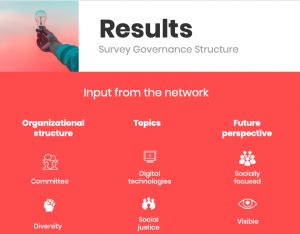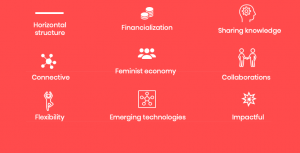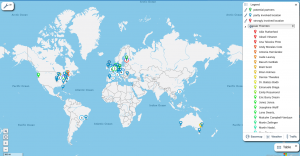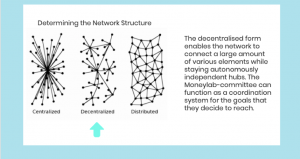Download the report as pdf here: Final product Moneylab
Looking back at MoneyLab #7: Outside of Finance, during a time wherein certainty was a comfortable concept, we can confirm that solidarity and alliance are now even more important. These are turbulent times wherein no one is excluded from the effects of the pandemic. This gives many people a moment to reflect on what is important for them and to decide what is needed the most for the upcoming years.
Right before this unexpected alteration, a general assembly was organized at the end of MoneyLab #7 to bring the actors within the Moneylab network closer to each other. The aim was to visualize the needs and wants of the diverse network and to discuss the organizational structure. Valuable input was shared among the group and the overall outcome was the need for mutual development of pragmatic digital tools and networking models for feminist economies, commons, and alt-fintech:


The critical view that Moneylab always shrived to retain has been way ahead of current social development and now this critical view seems not so ahead of time anymore. Critically re-thinking social structures are now happening on a large scale and this is why Moneylab’s guidance is required more than ever.
During my time as an intern for Moneylab, I further explored the needs and wants of the Moneylab network and researched the possibilities in terms of organizational structure. The Moneylab Network is so diverse with followers all over the world:

This group of like-minded people can make a greater impact if the network would be stronger connected. The question is how do you organize a network like Moneylab without influencing the diverse input of all its followers?
After surveying various professionals within the network, the results made clear that the need for some sort of governance is present. The ability to coordinate events and establish collaborations would be highly efficient with a group of individuals that will step forward to form a committee or board. The sense of a strong community would be energized with a constant engine that mobilizes the network to achieve common goals. The members of the committee will step forward as a representative for their area (revered as a ‘’hub’’) ’of expertise to form a diverse committee that can provide the desired guidance for the network. The structure of this committee is horizontally structured with flexible seats to maintain the critical dialogue amongst this assembly. The diversity of every individual hub is essential to maintain while a coordination mechanism is applied. Therefore, the network would have the most gain with a decentralized network structure:

This form of organization will connect all the separate hubs while overall coordination is being provided. The affiliated Moneylab network can maintain its autonomy while continuing their work on a local level. Due to resource constraints, these types of networks emerge increasingly every day. Overcoming these constraints requires synergy for combining resources to enable the realization of larger projects. Each hub has its cluster of connections with knowledge and resources that can be efficiently distributed amongst the other hubs within the global network.
Six important partners of the Moneylab network did already step forward to assemble the committee. This promising formation is the beginning of many great projects and collaborations. An overall mission will be easier to maintain, and mutual development of ideas and projects will be stimulated with a constant voice. This formation will satisfy the need for change with a voice that can provide the guidance that we now need.


